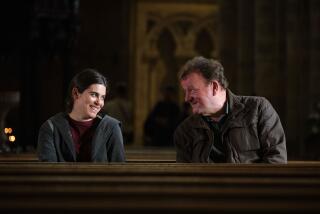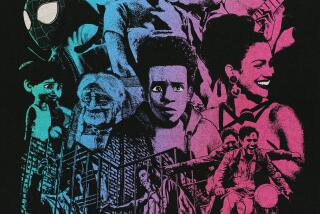‘Carla’s Song’ Starts Slow but Works to a Crescendo
Ken Loach’s “Carla’s Song” is a lesser “Land and Freedom” in that both films focus on a young man from Britain who goes abroad and experiences love and revolution. Alas, “Land and Freedom” was such an excellent film in its illumination of the complexities of the Spanish Civil War--and of an intimate relationship--that “Carla’s Song,” which takes its hero from Glasgow to Nicaragua in 1987, suffers all the more in comparison.
The primary problem for “Carla’s Song,” which was made in 1996, is one of structure. First-time screenwriter Paul Laverty, a former Glasgow lawyer who spent 2 1/2 years in the mid-’80s working in Central America with human rights organizations, has written a script that requires spending 54 minutes of its 125-minute running time to get George (Robert Carlyle), a free-spirited Glasgow bus driver, on a plane for Nicaragua, just as the contras are overwhelming the Sandinistas.
While in Glasgow, George crosses paths with Carla (Oyanka Cabezas), a beautiful but traumatized Nicaraguan street performer, and you know that they will fall in love. The film deftly establishes George as a rebel--and then keeps reiterating that point, while a number of cliches of romantic comedy are awkwardly played against the unfolding of Carla’s fragile emotional state. In short, the Glasgow sequence, essentially a prologue, takes on a protracted, contrived quality from which the film, for all the passion and commitment Loach consistently brings to it, never recovers.
On the plus side are the wiry Carlyle, who went on to star in “The Full Monty,” and the lovely Cabezas; both have endless charm and magnetism. Indeed, Carlyle is an actor of formidable concentration and expressiveness. But even the pleasure we can take in the stars’ performances is marred by the fact that both have such thick accents that we lose about half of what they’re saying (this is so even when considering the film’s sound has been carefully set at optimal level).
In any event, Carla had come to the U.K. to promote the Sandinista cause in the wake of the terrible fate that had befallen her lover and so many of her people, only to find herself adrift and increasingly suicidal. Once she and George fall in love, they agree that Carla must return to discover whether her lover is, in fact, still alive, and where she stands with George, who decides to accompany her.
“Carla’s Song” picks up considerably when the couple finally arrive in war-torn Nicaragua, where they contact Bradley (Scott Glenn, very good), an American who has thrown his lot with the Sandinistas but who is tormented by a dark past. There could be more clarity in regard to the complexities of Nicaragua’s tragic predicament, but one of the film’s real pluses is that it is not preachy: The CIA’s role in the suffering and oppression of the Nicaraguan people is expressed by Bradley in one angry, damning outburst.
In its last 20 minutes or so, “Carla’s Song,” so beautifully photographed by Barry Ackroyd, catches fire and blazes with suspense and emotion, but its powerful conclusion leaves you regretting that getting there was so labored.
* Unrated. Times guidelines: The film includes scenes of warfare, some adult situations and language.
‘Carla’s Song’
Robert Carlyle: George
Oyanka Cabezas: Carla
Scott Glenn: Bradley
A Shadow Distribution release of a Channel Four Films presentation, with the support of the Glasgow Film Fund and Institute of Cullture, Nicaragua, and ARD/DEGETO Film, Filmstiftung Nordrhein-Westfalen, Television Espan~ola and Alta Films, of a Parallax Picture in co-production with Road Movies Dritte Produktionen and Tornasol Films, S.A. Director Ken Loach. Producer Sally Hibben. Screenplay by Paul Laverty. Cinematographer Barry Ackroyd. Editor Jonathan Morris. Costumes Daphne Dare, Lena Mossum. Music George Fenton. Production designer Martin Johnson. Art director Fergus Clegg. Running time: 2 hours, 5 minutes.
*
* Exclusively at the Grande 4-Plex, 345 S. Figueroa St., downtown Los Angeles, (213) 617-0268.
More to Read
Only good movies
Get the Indie Focus newsletter, Mark Olsen's weekly guide to the world of cinema.
You may occasionally receive promotional content from the Los Angeles Times.










